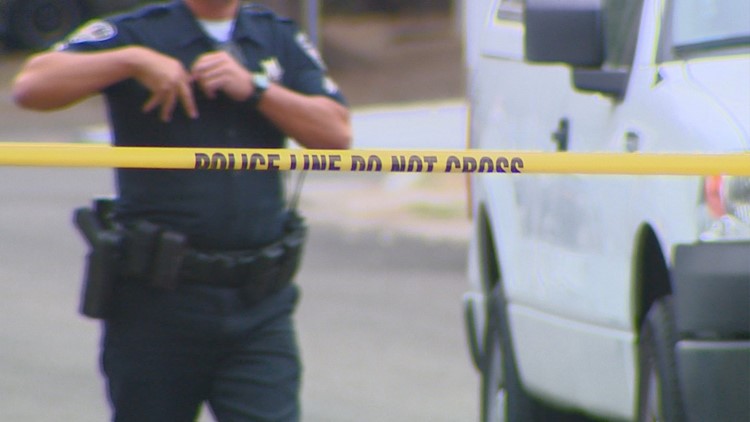BOISE, Idaho — Editor's Note: This article was originally published by the Idaho Press.
An ordinance proposed by the city of Boise to dissolve its current Office of Police Oversight in favor of a new model will also remove the oversight office’s ability to initiate investigations of citizen complaints on its own, raising concerns about the decision’s potential fallout in communities where trust in police is already low.
The proposed ordinance will require all citizen complaints received by the new Office of Police Accountability to be forwarded directly to Internal Affairs at the Boise Police Department for investigation, according to a copy of the draft ordinance filed April 15. Experts say this undermines the independence of the office and will likely deter people who don’t feel comfortable working with the police from participating in the complaint process.
The draft ordinance said the accountability office will "conduct any additional investigation" if it deems the Internal Affairs' investigation to be incomplete or inadequate. However, city spokesman Seth Ogilvie said Monday that the formalized regulations for the new office will include language allowing it to investigate a complaint concurrently with Internal Affairs. The draft ordinance language was kept “ambiguous,” he said, so that the incoming director “has the ability to craft the department into what they want it to be.”
Boise’s current Office of Police Oversight, founded in 2014 following the 2013 departure of the city’s full-time police ombudsman, is staffed with a part-time director and part-time analyst, as well as three on-call, part-time investigators, constituting a total of about 100 hours a week, said Office of Police Oversight Director Natalie Camacho-Mendoza.
Camacho-Mendoza took the office's part-time director position in 2015 and has since helped build the office up to the way it functions today. She has approximately 27 years of legal experience, a background in activism and advocacy on behalf of communities of color, and sits on the executive committee of the NAACP of the Treasure Valley. Prior to joining the office Camacho-Mendoza approached former Mayor Dave Bieter with the NAACP’s concern that the shift to a part-time director was a first step in phasing out the ombudsman’s office.
She was asked to apply for the position and became its part-time director, but six years later, the office is being dissolved. Current staff have been told they’ll be given a work-through date and can reapply to the positions created, which Camacho-Mendoza said the city has told her is estimated to constitute a 60-hour work week, less time spent on investigations than what the office is able to do currently.
Camacho-Mendoza operates the office with her staff in addition to her law practice, and while she acknowledges that a full-time expansion is a step in the right direction for an office tasked with so much, Boise’s Office of Police Oversight has taken significant steps to build and fortify relationships with community members who do not feel represented by the police, as well as with the police officers themselves.
"I’ve built up the department so that the backgrounds of the people who work here will add as much value as possible. In my last annual report, I pointed out that if you add up the number of years that my entire staff has in criminal justice law, first responder and law enforcement training, internal affairs investigation, criminal investigation, human resources, community relations, community engagement, community relational policing, and the decertification of police officers — it’s over 100 years," said Camacho-Mendoza.
Staff hasn’t been told why the office is being phased out and according to Camacho-Mendoza, the city council did not ask for her office’s input on the decision.
City officials referred questions about the proposed changes to a recording of an April 13 city council work session, where the city council did not discuss why it opted not to expand the current office or why the proposed ordinance reduces the new office's investigative authority. Two city council members contacted for interviews did not respond by press time Friday.
“We’re on call 24/7,” Camacho-Mendoza said. "You live, eat, sleep this work, but it’s so important, especially now. The expectations are very high.”
Ogilvie told the Idaho Press the new model would actually expand the oversight office's investigative abilities, including mandating the investigation of critical incidents involving serious injury or death, and allowing the office to hire an outside investigator with approval from the mayor.
There are a variety of models of police oversight in the United States but no uniform regulation that dictates how cities can approach the process. Boise’s Office of Police Oversight is a hybrid model. The office independently investigates complaints and also audits the police department, but is formalized into the city’s department structure. The office does not have subpoena power, something that advocates say would improve the quality of investigations as well as build public trust.
In Idaho, the Boise Police Department is one of only two departments overseen by an independent police oversight office or review board. The other is a citizen review board for the Fort Hall Police Department on the Fort Hall Reservation, which is home to the Shoshone-Bannock Tribes, according to a previous Idaho Press report.
A 2007 Law Enforcement Management and Administrative Statistics survey, one of the most recent and comprehensive data sets available, states that only 7.6% of all police agencies in the United States had a civilian complaint review board/agency in its jurisdiction, said Bill King, Ph.D., professor of criminal justice at Boise State University.
Of those 218 agencies, only 70 had subpoena power, which is not included in Boise’s proposal to revamp its oversight office. The ordinance does keep intact language requiring city agencies and employees to cooperate with the oversight office.
In a 2015 report in the Hastings Race and Poverty Journal, researchers wrote that “Absent the power to compel officers to testify, the thoroughness of an investigation suffers because the process hinges upon each side voluntarily and truthfully sharing their side of the story.”
Subpoena power is necessary for getting officers to testify against other officers, they say.
If a citizen doesn’t like the way Boise Police Department’s Internal Affairs Office handles a complaint investigation, that citizen can appeal to the Office of Police Oversight. That won’t change under the new ordinance, but the ability of the oversight office to complete its own independent investigations into citizen complaints will be removed.
This will likely deter people from reporting complaints about officers, King said.
“There are a number of best practices in how to establish oversight bodies. One way is if you’re going to have an external police oversight body, you don’t want to rely on cops to tell you what the problems are with cops,” King said.
“There are oversight bodies that don’t do that, and police departments are notorious for chasing off people when they come to make a complaint. That defeats the entire purpose. It’s like fishing with a net full of holes.”
According to research by the National Association for Oversight of Law Enforcement, “Civilian witnesses may be more willing to be involved and forthcoming in an investigation if it is conducted by an independent agency separate from the law enforcement agency.”
As the city intends to delegate outreach responsibility to the Office of Community Engagement, which is not staffed with police oversight experts, the outreach platform that Camacho-Mendoza and her staff have developed over the course of six years may not function as effectively as it does currently.
Sometimes, people will call the Office of Police Oversight just to discuss community concerns with law enforcement, and police oversight and community relational policing is a specific expertise. “You have to understand the demands being made locally and nationally on the topic of public safety about reform or the other arguments of defunding, or abolishing, and just focusing on law enforcement and public safety,” Camacho-Mendoza said.
“You have to have pretty in-depth knowledge of all those things as well as understanding policing and understanding the policy and procedure of the police department. … You have to be able to explain to the public why a situation occurred the way it did or why the police officers conduct themselves in a certain way under certain policy.”
Another proposed change to the office is that responsibility for training and policy recommendations for officer wellness, diversity and bias training, and leadership development will be delegated to a newly created captain position at the police department.
That new hire is well-credentialed to be able to handle those responsibilities, Camacho-Mendoza said. “The difference is, once again, Office of Police Oversight is independent. We don’t report to the chief of police. He doesn’t control what we do and the recommendations we make. It’s not an independent ‘third eye’ on those activities,” she said.
At a Boise City Council work session on April 13, Courtney Washburn, chief of staff to Mayor Lauren McLean said, “We believe that these responsibilities are better housed in the new division than the Office of Police Oversight. That doesn’t mean that the new proposed office wouldn’t advise the training division on recommended policy changes, but there would not be a duplication of effort.”
The Boise Police Department on April 20 discussed with the city council its desire to hire an additional 100 police officers to reduce strain on its current staff. Thirty-five of those new officers would be hired for supervision, overtime costs, criminal investigations, a rise in high tech crimes, training and education, liaisons and community connections, according to Police Chief Ryan Lee, who suggested that the department is struggling to keep up with its training responsibilities as the city rapidly grows.
In a statement, the Boise Police Department said, “The Boise Police Department looks forward to working with the new Office of Police Accountability. We welcome opportunities to improve our policies, our training and our performance as we strive to deliver the kinds of police services our community expects and deserves. We have a long history of engaging with community members and working to be responsive to the changing needs of a growing and thriving city. We have enjoyed a positive working relationship with the former City of Boise Community Ombudsman’s office for 14 years, as well as the current Office of Police Oversight, in place since 2014. As the new Office of Police Accountability takes shape, we will strive to work with them to ensure transparency and legitimacy of the Boise Police Department in the eyes of our community members.”
The city council is set to continue considering the draft ordinance at a future meeting.



